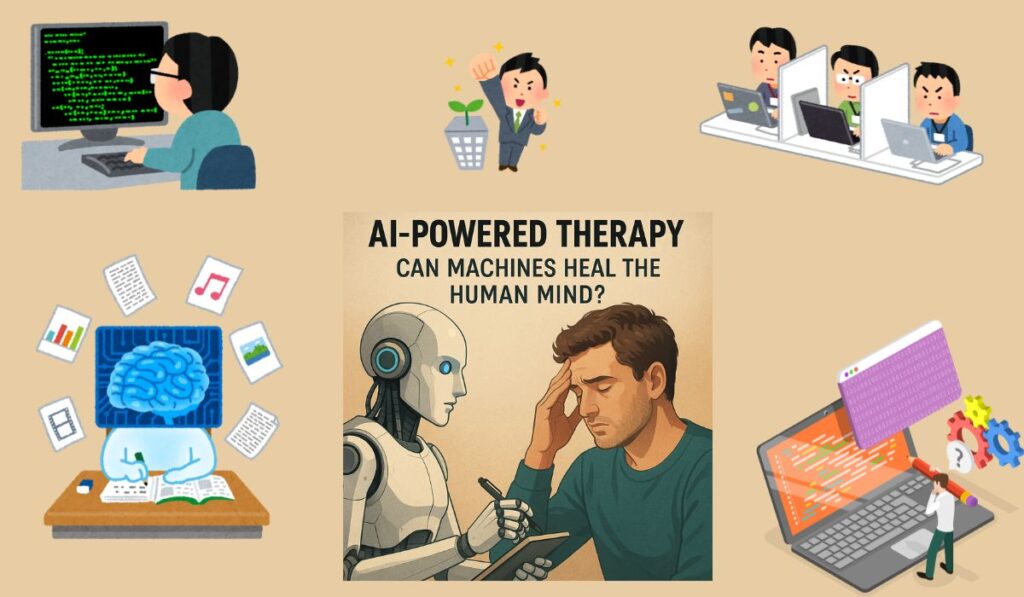
As artificial intelligence (AI) enters the therapist’s chair, experts and users alike wrestle with the emotional and ethical boundaries of machine-mediated mental health care.
When Adam, a 33-year-old high school teacher in London, suffered mental illness during the pandemic’s long shadow, he turned to therapy—only to be met with 3-month waitlists and steep private fees. Out of desperation, he downloaded an app called Woebot, an AI-powered chatbot offering emotional support grounded in Cognitive Behavioral Therapy (CBT).
“I thought it would be cold and useless,” Adam admits. “But it helped me reframe some deeply anxious thoughts. In a strange way, I felt like it understood me—at least more than silence ever did.”
Stories like Adam’s are becoming increasingly common, prompting a powerful and polarizing question: Can machines really help us heal mentally and emotionally?
🌐 The Emergence of AI Therapy
The concept of AI therapy may have once belonged to science fiction, but today, it’s part of everyday mental health care. Platforms like Wysa, Twill, Woebot, and X2AI’s Tess are being deployed in schools, hospitals, workplaces, and even refugee camps.
Unlike traditional therapy, these tools are available 24/7, speak in natural language, and never grow impatient. Users report that AI chatbots often help them recognize unhelpful thought patterns, track emotional trends, and even offer mindfulness exercises on demand.
In low-resource settings or high-stigma cultures, AI becomes more than a convenience—it becomes a lifeline in some cases.
🔍 The Science Behind Machine Support
Most AI therapy platforms rely on CBT frameworks, which lend themselves well to automation. These systems ask guiding questions, identify negative thought loops, and offer structured responses. Machine learning allows these bots to personalize interactions over time based on user mood, tone, and behavior patterns.
According to a 2025 study by the World Health Organization, AI-based therapy apps were associated with a 20–35% improvement in reported emotional wellbeing across diverse populations, especially among first-time therapy seekers.
“AI doesn’t heal the trauma,” says many healers, experts & neuroscientist . “But it can hold space for the user to process pain. That in itself can be powerful.”
⚖️ The Ethical Gray Zone
Despite the breakthroughs, critics warn that AI therapy walks a fine ethical line.
What happens when a chatbot gives advice that worsens someone’s mental state? What if it fails to detect suicidal ideation? Unlike licensed therapists, AI tools cannot respond with full accountability or nuanced human care.
In 2024, a popular AI therapy app was found collecting user data without consent and sharing it with advertisers—raising serious concerns about confidentiality.
“You’re baring your soul to a machine that might be selling your emotions,” warns cybersecurity . “That’s not just unethical—it’s dangerous.”
NOTE: use secure app which have a good ratings and verified.
If these types of apps can heal with simply by changing the thought patterrn, we are really thankful!
🔮 The Future: AI as a Mental Health Partner
The most promising evolution lies in hybrid models, where human therapists use AI tools to augment diagnosis, mood tracking, or crisis alerts. For example, AI can flag when a patient’s language becomes more self-critical or when sleep patterns shift, allowing therapists to intervene early.
Startups are even experimenting with emotion-sensing AI, capable of reading vocal inflection, facial expression, or wearable biosignals to tailor interventions in real time.
And while we’re still far from robots with emotional intelligence, these innovations point to a future where AI becomes an active partner in healing, rather than just a tool.
🧩 Final Thoughts
So—can machines heal the human mind?
They can support it, simulate empathy, and offer comfort when no one else is available. But healing depends deeply on human, rooted in connection, thought pattern, vulnerability, and trust.
AI may never cry with you.
But sometimes, it’s enough that it listens.
